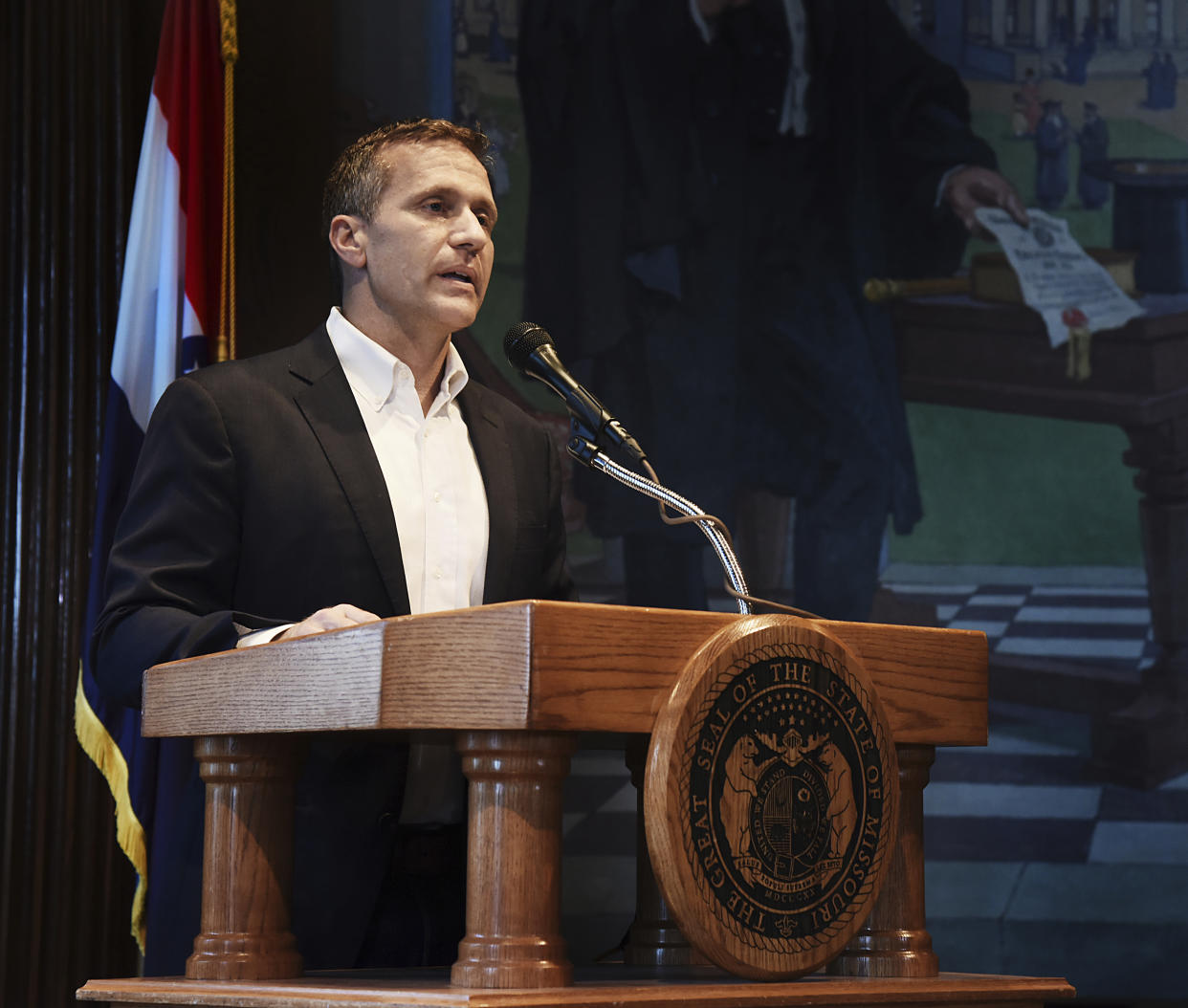The stunning rise and fall of Eric Greitens

Politicians rise and fall, but it is difficult to think of an ascent as swift, or a downfall as brutal, as that of Gov. Eric Greitens of Missouri. Celebrated only months ago as a potential Republican presidential candidate, Greitens resigned the governorship on Tuesday, as state legislators in Jefferson City expanded their inquiry into potential wrongdoing related to campaign fundraising — and moved to impeach him over the alleged blackmail and sexual assault of a woman with whom he’d once had an extramarital relationship.
Even as he announced his resignation, the telegenic former Navy SEAL and Rhodes Scholar looked defiant, striking repeated notes of self-pity. “This ordeal has been designed to cause an incredible amount of strain on my family,” he said in the afternoon press conference.
That “ordeal” began with the revelation that Greitens had conducted a sexual affair with his hairdresser in 2015, and that he had blackmailed the woman, who was, like him, married at the time. According to a report subsequently released by a special legislative committee, Greitens allegedly coerced the woman into oral sex, struck her and took a compromising photograph that he threatened to share if she didn’t keep their affair secret.
Greitens was charged with violating the woman’s privacy, and though a St. Louis circuit attorney eventually dropped that charge, state legislators indicated that they would move forward with impeachment proceedings. Greitens acknowledged the affair but strenuously denied allegations of blackmail. And although the photograph — supposedly taken on a phone, while the woman was in his basement gym, bound and partially disrobed — has never been produced, it remains the central symbol of the young governor’s stunning collapse, seemingly brought about by his own hubris.
As an emotional Greitens left the podium on Tuesday, someone from the audience shouted, “Governor, did you take the photo?” Greitens did not answer.
“I have not broken any laws,” Greitens said during the press conference. He has consistently portrayed the several investigations into his personal behavior and political activity as motivated by career politicians from both parties whom he has portrayed as unable to countenance his iconoclastic style. Even as he resigned, Greitens cast himself as the victim, complaining of “millions of dollars of mounting legal bills,” as well as “endless personal attacks designed to cause maximum damage to family and friends.”

What ultimately felled Greitens, however, were not the embarrassing — and troubling — details of his extramarital affair. Concurrent with that investigation were several others related to his campaign fundraising. One is looking into whether Greitens improperly used donor lists from the Mission Continues, a charity he started to help veterans, to raise money for his political campaigns. Using those lists would be against federal law.
Last week, the special legislative committee that was investigating Greitens on the violation of privacy charge dramatically expanded its scope by turning its attention to A New Missouri, a not-for-profit organization started by Greitens supporters to “promote ideas, policies and/or legislation to create more jobs, higher pay, safer streets, better schools, and more, for all Missourians,” as the group described itself. The committee had apparently come to believe that A New Missouri had coordinated with Greitens’s political campaign in ways that were potentially illegal.
Hours before he announced his resignation, Greitens learned of a judge’s order that A New Missouri reveal its donor list by the end of the week. It is not clear how much that development had to do with his decision to resign.
Greitens was elected in 2016 promising to “clean up” Jefferson City. But he made few friends as governor, while succumbing to the very same ethical lapses he promised to banish from Missouri. By the time his troubles began earlier this year, he had virtually no allies. And he was increasingly seen as a liability to Josh Hawley, the Republican trying to unseat Sen. Claire McCaskill, a Democrat. Eager to show his independence, Hawley vowed to investigate Greitens, wanting to deprive McCaskill of an obvious, and damaging, line of attack.
Greitens has long relied on his background as a Navy SEAL as a sign of his rectitude and patriotism. But a recent New Yorker magazine investigation by Phil Klay, the military veteran and fiction writer, found that Greitens had cynically (and dishonestly) “used his military background to create a public image of honor, courage, and leadership.” Similar accusations have been made against Ryan Zinke, the Interior secretary, who has exaggerated his involvement with the SEALs. Zinke has faced a number of questions about the exorbitant and potentially improper use of government funds.
Some have pointed to the two men as examples of a SEAL culture gone dangerously astray. In fact, questions about the elite unit have only grown since its members killed al Qaida leader Osama Bin Laden in 2011. Writing in Newsweek the following year, Daniel Klaidman, now the editor of Yahoo News, noted that “a culture of celebrity, instant book deals and Hollywood blockbusters” was creating competing impulses that SEAL leadership failed to resolve.
To some observers, Greitens’s stated decision to stay in office was a hint of his SEAL resolve. Until Tuesday, he had vowed to fight the multiple investigations into his conduct. Much like President Trump, he attempted to portray himself as the subject of a “witch hunt.” Those efforts did not succeed.
The new governor of Missouri will be Michael Parson.
Read more from Yahoo News:



